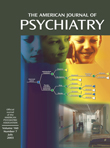Olanzapine Versus Divalproex Sodium for the Treatment of Acute Mania and Maintenance of Remission: A 47-Week Study
Abstract
OBJECTIVE: Few double-blind trials have compared longer-term efficacy and safety of medications for bipolar disorder. The authors report a 47-week comparison of olanzapine and divalproex. METHOD: This 47-week, randomized, double-blind study compared flexibly dosed olanzapine (5–20 mg/day) to divalproex (500–2500 mg/day) for manic or mixed episodes of bipolar disorder (N=251). The only other psychoactive medication allowed was lorazepam for agitation. The primary efficacy instrument was the Young Mania Rating Scale; a priori protocol-defined threshold scores were ≥20 for inclusion, ≤12 for remission, and ≥15 for relapse. Analytical techniques included mixed model repeated-measures analysis of variance for change from baseline, Fisher’s exact test (two-tailed) for categorical comparisons, and Kaplan-Meier estimates of time to events of interest. RESULTS: Over 47 weeks, mean improvement in Young Mania Rating Scale score was significantly greater for the olanzapine group. Median time to symptomatic mania remission was significantly shorter for olanzapine, 14 days, than for divalproex, 62 days. There were no significant differences between treatments in the rates of symptomatic mania remission over the 47 weeks (56.8% and 45.5%, respectively) and subsequent relapse into mania or depression (42.3% and 56.5%). Treatment-emergent adverse events occurring significantly more frequently during olanzapine treatment were somnolence, dry mouth, increased appetite, weight gain, akathisia, and high alanine aminotransferase levels; those for divalproex were nausea and nervousness. CONCLUSIONS: In this 47-week study of acute bipolar mania, symptomatic remission occurred sooner and overall mania improvement was greater for olanzapine than for divalproex, but rates of bipolar relapse did not differ.



